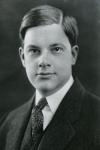Biography
Alfred Joyce Kilmer was born in New Brunswick, New Jersey on December 6, 1886. He was educated at Columbia University, graduating in 1908. From 1909 to 1912 he was associated with Funk and Wagnall's Company, working as an editor on their dictionary. He served as Literary Editor of the "The Churchman", an Anglican newspaper (Joyce Kilmer converted to Catholicism towards the end of 1913) and in 1913 became a member of the staff of "The New York Times."
When the U.S. declared war on Germany in 1917, Kilmer was a family man with a wife and children. He would not have been required to serve. Never-the-less he enlisted as a private in the Seventh Regiment, New York National Guard. At his request and with the assistance of Father Duffy, he transferred into the 165th Infantry, the old Fighting 69th. While the Regiment was at Camp Mills he was transferred to Company H, Headquarters Company and assumed the position of Senior Regimental Statistician. Once in France he quickly attained the rank of Sergeant and was attached to the newly organized Regimental Intelligence staff as an observer. He spent many nights on patrol in no-man's land gathering information which would be of tactical importance to the Regiment and the Division.
In his position on the Regiment's Intelligence staff, Kilmer had no front line responsibilities during combat operations, but he would not be kept out of action while his comrades were at risk. On July 30th 1918, during the battle of the Ourcq, he attached himself as adjutant to Major William Donovan, commanding the First Battalion. Donovan's adjutant, Lt. Oliver Ames had been killed in combat the day before. A sniper's bullet ended the soldier-poet's life. He died, at 31 years of age, facing the enemy.
The Regiment's principle objective on that day had been the high ground of Muercy Farm. Lt. Ames and Sgt. Kilmer were buried side by side in a creek bed on that farm.
Joyce Kilmer was awarded the French Croix de Guerre for bravery.
Camp Kilmer in New Jersey is named for him.
As a poet and author, Kilmer is remembered today mostly for the poem "Trees" published in 1914. At the time of his entry into military service he was considered the premiere American Catholic poet alive. Much of his work expressed his deep religious beliefs. An example is "Prayer of a Soldier in France." Such expressions of faith are not popular in the later half of the 20th century. ..






